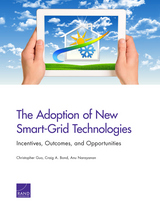


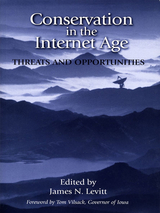
Since the earliest days of our nation, new communications and transportation networks have enabled vast changes in how and where Americans live and work. Transcontinental railroads and telegraphs helped to open the West; mass media and interstate highways paved the way for suburban migration. In our own day, the internet and advanced logistics networks are enabling new changes on the landscape, with both positive and negative impacts on our efforts to conserve land and biodiversity. Emerging technologies have led to tremendous innovations in conservation science and resource management as well as education and advocacy efforts. At the same time, new networks have been powerful enablers of decentralization, facilitating sprawling development into previously undesirable or inaccessible areas.
Conservation in the Internet Age offers an innovative, cross-disciplinary perspective on critical changes on the land and in the field of conservation. The book:
- provides a general overview of the impact of new technologies and networks
- explores the potentially disruptive impacts of the new networks on open space and biodiversity
- presents case studies of innovative ways that conservation organizations are using the new networks to pursue their missions
- considers how rapid change in the Internet Age offers the potential for landmark conservation initiatives
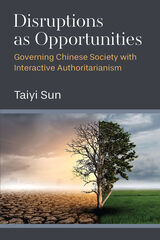

China is emerging as a truly global economic and political power. China’s impact on Latin America and the Caribbean region is mixed, however—fostering a trade market for some countries, but creating competition for others.
This pioneering volume, produced by the Inter-American Development Bank’s Integration and Regional Programs Department and Research Department, provides a comprehensive overview of China’s economic policy and performance over recent decades and contrasts them with the Latin American experience. What are the underlying factors behind China’s competitive edge? What are the strategic implications of China’s rise for growth and development in Latin America? These questions open new avenues for thinking about revitalizing development strategies in Latin America in the face of China’s successful development and reduction of poverty. This insightful report is a must-read for analysts, policymakers, and development practitioners, not only in Latin America and the Caribbean, but wherever China’s presence is being felt.
The Emergence of China is a copublication of the David Rockefeller Center for Latin American Studies and the Inter-American Development Bank.
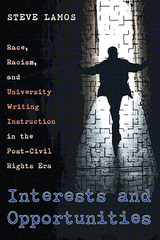
In the late 1960s, colleges and universities became deeply embroiled in issues of racial equality. To combat this, hundreds of new programs were introduced to address the needs of “high-risk” minority and low-income students. In the years since, university policies have flip-flopped between calls to address minority needs and arguments to maintain “Standard English.” Today, anti-affirmative action and anti-access sentiments have put many of these high-risk programs at risk.
In Interests and Opportunities, Steve Lamos chronicles debates over high-risk writing programs on the national level, and locally, at the University of Illinois at Urbana-Champaign. Using critical race theorist Derrick Bell’s concept of “interest convergence,” Lamos shows that these programs were promoted or derailed according to how and when they fit the interests of underrepresented minorities and mainstream whites (administrators and academics). He relates struggles over curriculum, pedagogy, and budget, and views their impact on policy changes and course offerings.
Lamos finds that during periods of convergence, disciplinary and institutional changes do occur, albeit to suit mainstream standards. In divergent times, changes are thwarted or undone, often using the same standards. To Lamos, understanding the past dynamics of convergence and divergence is key to formulating new strategies of local action and “story-changing” that can preserve and expand race-consciousness and high-risk writing instruction, even in adverse political climates.


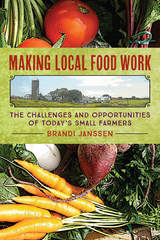
By listening to and working alongside people trying to build a local food system in Iowa, Janssen uncovers the complex realities of making it work. Although the state is better known for its vast fields of conventionally grown corn and soybeans, it has long boasted a robust network of small, diverse farms, community supported agriculture enterprises, and farmers’ markets. As she picks tomatoes, processes wheatgrass, and joins a parents’ committee trying to buy local lettuce for a school lunch, Janssen asks how small farmers and CSA owners deal with farmers’ market regulations, neighbors who spray pesticides on crops or lawns, and sanitary regulations on meat processing and milk production. How can they meet the needs of large buyers like school districts? Who does the hard work of planting, weeding, harvesting, and processing? Is local food production benefitting rural communities as much as advocates claim?
In answering these questions, Janssen displays the pragmatism and level-headedness one would expect of the heartland, much like the farmers and processors profiled here. It’s doable, she states, but we’re going to have to do more than shop at our local farmers’ market to make it happen. This book is an ideal introduction to what local food means today and what it might be tomorrow.


Volume editors Benito Estrada Aranda and Ines Sleeboom-van Raaij have divided the book into three parts—Mental Health Issues and Treatment, Deaf Populations, and Deaf Children and Their Families. In the first part, the contributors provide in-depth analysis of specific challenges and treatment modalities ranging from the provision of mental healthcare as a basic human right to psychopharmacological treatment, the challenges in developing mental health services for deaf and hard of hearing people in countries where none exist, and new treatment therapies.
Part two looks at issues of self-esteem and cultural identity among deaf and hard of hearing adults in Greece and Cyprus, the services for deaf people at a public health clinic in Austria, and the quality of life among Latino Deaf bilinguals in the United States. In the last part, the contributors focus on mental health issues found in deaf children and adolescents and on the relationships between deaf teenagers and their hearing mothers. The volume concludes with a case study of a prelingually deaf child diagnosed as autistic. Taken all together, these cutting-edge articles explore the important issues within the specialized area of mental health and deafness.
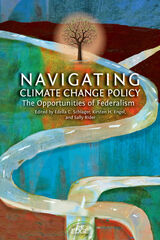
Federalism—the system of government in which power is divided among a national government and state and regional governments—is well-suited to address the challenges of climate change because it permits distinctive policy responses at a variety of scales. The chapters in this book explore questions such as what are appropriate relationships between states, tribes, and the federal government as each actively pursues climate-change policies? How much leeway should states have in designing and implementing climate-change policies, and how extensively should the federal government exercise its preemption powers to constrain state activity? What climate-change strategies are states best suited to pursue, and what role, if any, will regional state-based collaborations and associations play? This book examines these questions from a variety of perspectives, blending legal and policy analyses to provide thought-provoking coverage of how governments in a federal system cooperate, coordinate, and accommodate one another to address this global problem.
Navigating Climate Change Policy is an essential resource for policymakers and judges at all levels of government who deal with questions of climate governance. It will also serve as an important addition to the curriculum on climate change and environmental policy in graduate and undergraduate courses and will be of interest to anyone concerned with how the government addresses environmental issues.

In addition to reviewing the existing literature on the political outcomes of social movements, this volume analyzes the examples of the American civil rights movement and anti-nuclear energy efforts in eighteen countries to forge a new understanding of their momentous impact.
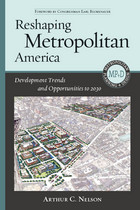
Nearly half the buildings that will be standing in 2030 do not exist today. That means we have a tremendous opportunity to reinvent our urban areas, making them more sustainable and livable for future generations. But for this vision to become reality, the planning community needs reliable data about emerging trends and smart projections about how they will play out. Arthur C. Nelson delivers that resource in Reshaping Metropolitan America.
This unprecedented reference provides statistics about changes in population, jobs, housing, nonresidential space, and other key factors that are shaping the built environment, but its value goes beyond facts and figures. Nelson expertly analyzes contemporary development trends and identifies shifts that will affect metropolitan areas in the coming years. He shows how redevelopment can meet new and emerging market demands by creating more compact, walkable, and enjoyable communities. Most importantly, Nelson outlines a policy agenda for reshaping America that meets the new market demand for sustainable places.

Blau begins by outlining the influences of population structures on intergroup relations and then examining the implications these influences have on occupational opportunities. He looks at the many groups within which an individual is likely to socialize—family, ethnic group, socioeconomic class—and the distance away from these groups an individual is likely to move. Blau demonstrates how such factors affect social mobility, which, in turn, influences membership and structures several types of organizations.
Blau then moves on to interpersonal relationships and analyzes the social exchanges in them that reveal the ultimate effects of ethnic, socioeconomic, and other aspects of population structures. He defines two types of power: influence in direct interpersonal exchange, and large-scale domination (economic or political) of groups without personal contact.

Village Housing explores the housing challenges faced by England’s amenity villages, rooted in post-war counter-urbanization and a rising tide of investment demand for rural homes. It tracks solutions to date and considers what further actions might be taken to increase the equity of housing outcomes and thereby support rural economies and alternate rural futures. The authors examine first the interwar reliance on landowners to provide tied housing and post-war diversification of responses to rising housing access difficulties, including from the public and third sectors; second, recent community-led responses; and third, actions that disrupt established production processes: self-build, low impact development, and a re-emergence of council provision. These responses to the village housing challenges are set against a broader backdrop of structural constraints and opportunities to reduce those constraints through planning, land, and tax reforms that can broaden the social inclusivity and diversity of villages and support their economic well-being.
READERS
Browse our collection.
PUBLISHERS
See BiblioVault's publisher services.
STUDENT SERVICES
Files for college accessibility offices.
UChicago Accessibility Resources
home | accessibility | search | about | contact us
BiblioVault ® 2001 - 2024
The University of Chicago Press









